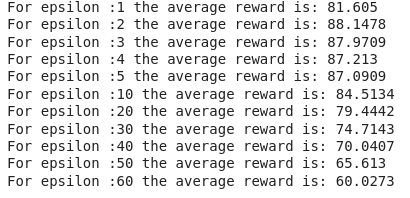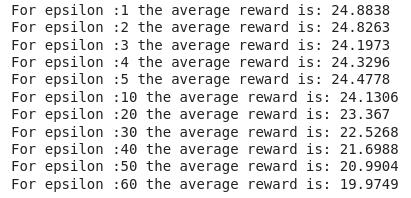
Exploration vs Exploitation
A colony of bees knows a garden of roses nearby. This garden is their primary source of nectar and pollen. There might be another garden far from their hive which might contain a variety of flowers. Going to that garden demands a lot of time and energy. Should this colony of bees continue bringing nectar and pollen from nearby rose garden or should they risk searching for better options.
We have four agents. Each of them can take three actions in a single episode. These three actions lead to different rewards. The goal of agents is to gain maximum reward in 10000 episodes.
Four different agents come up with four different strategies. They are:
- Agent I : Greedy : Always exploit
- Agent II: Random: Always Explore
- Agent III: Epsilon greedy : Almost always greedy and sometimes randomly explore
- Agent IV: Decaying Epsilon Greedy: First Maximize Exploration and then exploitation
Three Bandits in code
import numpy as np
import random
def three_arm_bandit(action):
if action == 0:
value = np.round(random.gauss(10,5))
elif action == 1:
value = np.round(random.gauss(20,3))
elif action == 2:
value = np.round(random.gauss(90,1))
else:
print("This action is not allowed")
return valueAgent I : Greedy : Always exploit
action_values = np.zeros((3,1))
total_action_values = np.zeros((3,1))
action_count = np.zeros((3,1))
episodes = 10000
total_value = 0
for i in range(episodes):
#choose the action with highest value
bandit = np.argmax(action_values)
#print("The chosen bandit: ",bandit)
#call the function to get a new value for choosen action
value = three_arm_bandit(bandit)
#print("The value: ",value)
action_count[bandit] = action_count[bandit]+1
#print("Action count of the particular bandit: ",action_count[bandit])
total_action_values[bandit] = total_action_values[bandit]+value
action_values[bandit] = total_action_values[bandit]/action_count[bandit]
#print("Action value of the particular bandit: ",action_values[bandit])
total_value = total_value + value
#print("\nEnd of the episode")
print("Total value:",total_value)
avg_value = total_value/episodes
print("Average value:",avg_value)
print(action_count)
print(action_values)Average reward gained per episode: 9.9558
Agent II: Random: Always Explore
action_values = np.zeros((3,1))
total_action_values = np.zeros((3,1))
action_count = np.zeros((3,1))
episodes = 10000
total_value = 0
for i in range(episodes):
#randomly choose the action
bandit = random.randint(0, 2)
#call the function to get a new value for choosen action
value = three_arm_bandit(bandit)
action_count[bandit] = action_count[bandit]+1
total_action_values[bandit] = total_action_values[bandit]+value
action_values[bandit] = total_action_values[bandit]/action_count[bandit]
#print(action_values[bandit])
total_value = total_value + value
avg_value = total_value/episodes
print("Average reward gained per episode:",avg_value)Average reward gained per episode: 39.7575
Agent III: Epsilon greedy : Almost always greedy and sometimes randomly explore
def epsilon_greedy(epsilon):
action_values = np.zeros((3,1))
total_action_values = np.zeros((3,1))
action_count = np.zeros((3,1))
episodes = 10000
total_value = 0
epsilon = epsilon
for i in range(episodes):
#epsilon
random_value = random.randint(0,10)
if(random.randint(0,100)<epsilon):
#randomly choose the action
bandit = random.randint(0, 2)
else:
#choose the action with highest value
bandit = np.argmax(action_values)
#call the function to get a new value for choosen action
value = three_arm_bandit(bandit)
action_count[bandit] = action_count[bandit]+1
total_action_values[bandit] = total_action_values[bandit]+value
action_values[bandit] = total_action_values[bandit]/action_count[bandit]
#print(action_values[bandit])
total_value = total_value + value
avg_value = total_value/episodes
return avg_value
epsilons = [1,2,3,4,5,10,20,30,40,50,60]
for epsilon in epsilons:
avg_value = epsilon_greedy(epsilon)
print("For epsilon :"+str(epsilon)+" the average reward is: "+str(avg_value))

Agent IV: Decaying Epsilon Greedy: First Maximize Exploration and then exploitation
#At the beginning the agent explores 10 % of time
#The exploration decrease with 1% after each 1000 episodes
import math
action_values = np.zeros((3,1))
total_action_values = np.zeros((3,1))
action_count = np.zeros((3,1))
episodes = 10000
total_value = 0
for i in range(episodes):
#epsilon
random_value = random.randint(0,10)
epsilon = math.ceil(episodes/(i+(episodes/10)))
#print(epsilon)
if(random.randint(0,100)<epsilon):
#print("choosing randomly in episode :", i)
#randomly choose the action
bandit = random.randint(0, 2)
else:
#choose the action with highest value
bandit = np.argmax(action_values)
#call the function to get a new value for choosen action
value = three_arm_bandit(bandit)
action_count[bandit] = action_count[bandit]+1
total_action_values[bandit] = total_action_values[bandit]+value
action_values[bandit] = total_action_values[bandit]/action_count[bandit]
#print(action_values[bandit])
total_value = total_value + value
avg_value = total_value/episodes
print("Average reward gained per episode:",avg_valueAverage reward gained per episode: 88.3668
Here the agent III and IV has better average than others. The third action has higher average than others. The agent which figures out this and then exploit it, is the winner.
Let us change the action and rewards little bit and see what happens.
def three_arm_bandit(action):
if action == 0:
value = np.round(random.gauss(10,1))
elif action == 1:
value = np.round(random.gauss(25,1))
elif action == 2:
value = np.round(random.gauss(15,5))
else:
print("This action is not allowed")
return value
Performance of Agent I
Average reward gained per episode: 10.0047
Performance of Agent II
Average reward gained per episode: 16.7323Performance of Agent III

Performance of Agent IV
Average reward gained per episode: 24.7583
Here second action has the highest mean. Average reward of Agent III and IV are closer to this value while rewards gained by Agent I and Agent II are far from this value.